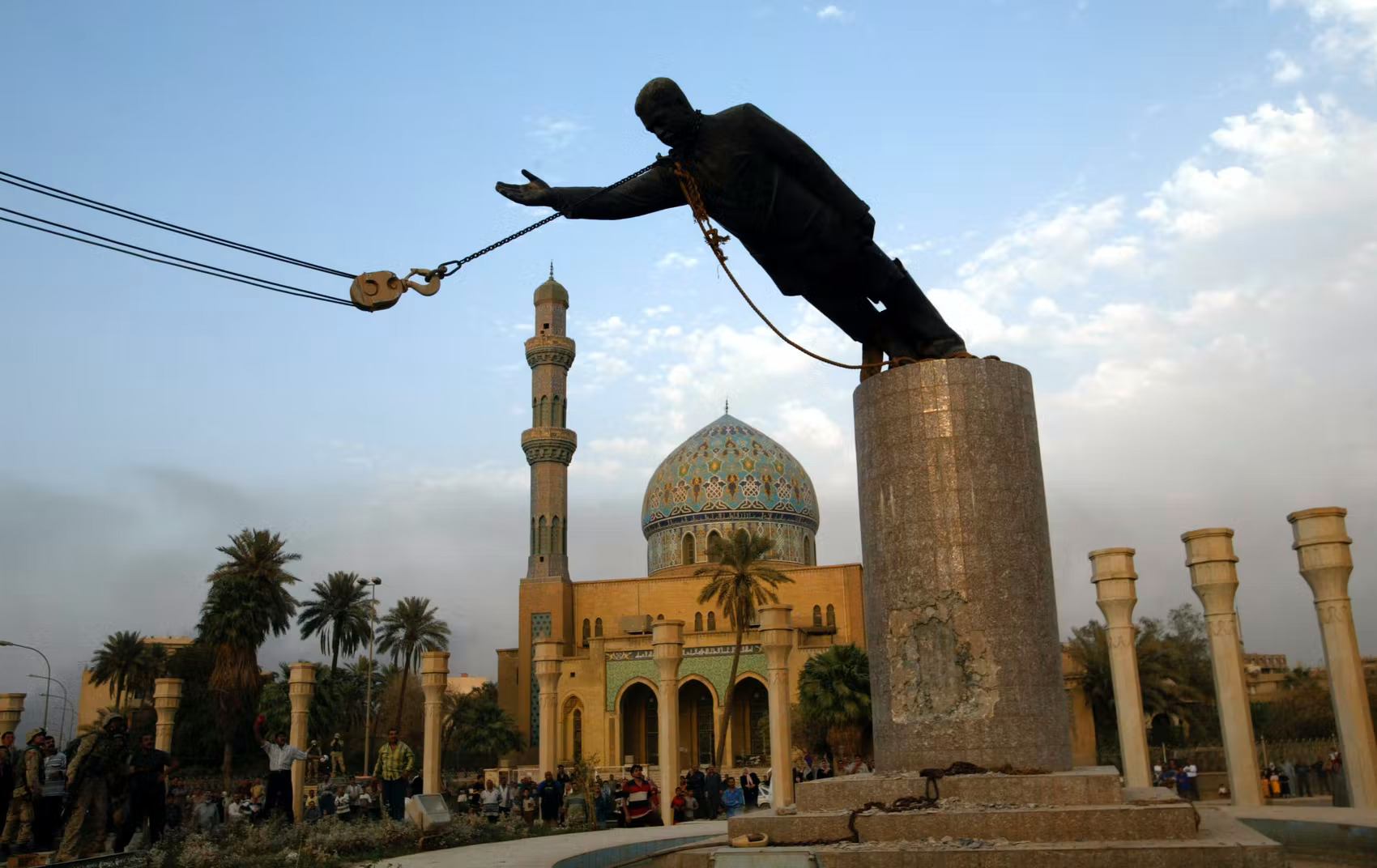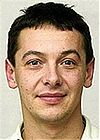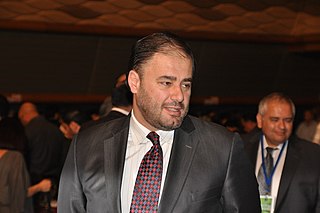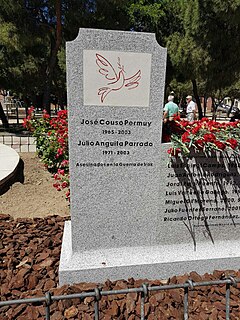On April 8, 2003, three locations in Baghdad housing journalists were fired upon by U.S. armed forces during 2003 invasion of Iraq, killing three journalists and wounding four.
Two American air-to-surface missiles hit the Qatar satellite TV station at Al Jazeera's office in Baghdad and killed Tareq Ayyoub, a Palestinian reporter, and wounded Zouhair al-Iraqi, an Iraqi cameraman. They were live broadcasting on the roof of the building. Al Jazeera accused the U.S. of intentionally targeting Al Jazeera as the U.S. bombed its Kabul bureau in 2001 during the U.S. invasion of Afghanistan.
A U.S. Army tank fired into the 15th floor of the Palestine Hotel in Baghdad, where almost all foreign journalists were based. The image of the hotel had been frequently broadcast in the news, since many journalists filmed their reports nearby. The tank fire killed the Reuters cameraman Taras Protsyuk and wounded three. José Couso of Telecinco Spanish television who was on the 14th floor also died.
At the time, Company A of the 4th Battalion, 64th Armored Regiment was holding the west end of the al-Jumhuria Bridge. The U.S. Forces were under attack from Iraqi units on both sides of the Tigris River, including mortar fire. Earlier that morning, the battalion had captured an Iraqi two-way radio, over which they heard an Iraqi forward observer directing mortar fire against Company A. This information was relayed to the forces at the bridge, who began looking for the enemy spotter. An A-Company tank spotted an individual on a balcony on the upper floor of a high-rise building to the southeast who appeared to be observing the company with "some kind of optics" (likely Protsyuk). Assuming this was the enemy spotter, the tank commander asked for and received permission to fire. The tank fired a HEAT round at the balcony, killing Protsyuk and Couso. Prior to the incident, no one in the 4-64 had been briefed about the Palestine Hotel or its location, since the hotel was not in their sector (the east bank of the Tigris was allocated to the 1st Marine Division). U.S. forces later determined that the Iraqi artillery spotter was probably in a nearby building, not the hotel. [1]
In 2008, Sgt. Adrienne Kinne, a former Arabic linguist in U.S. Army Intelligence, reported that she had seen secret documents listing the Palestine Hotel as a possible military target prior to the 2003 shelling incident.[ citation needed ]
Office of the United Arab Emirates satellite channel Abu Dhabi was hit by air strikes. The station aired the picture of Iraqi fire from beneath the camera.[ citation needed ]
Pentagon
During a briefing from The Pentagon on April 8, a reporter asked "(...) There are reports that a tank took small arms and perhaps R.P.G. fire from the direction of the hotel, although journalists say that they saw no sign of it. Do you think that's reason enough for a tank to fire a round at the hotel where you know there are unarmed journalists?" [2]
Major General Stanley McChrystal answered "(...) particularly with this war, journalists have been closer to coalition soldiers than probably ever before with the embedded program, and those who are not. (...) When [forces] get into combat in the cities, which, from the beginning, we had specifically said would be dangerous and difficult, you put yourself in their position, they had the inherent right of self-defense. When they are fired at, they have not only the right to respond, they have the obligation to respond to protect the soldiers with them and to accomplish the mission at large (...)." [2]
U.S. Central Command
At a briefing in Doha, Qatar, Brigadier General Vincent K. Brooks said of the Al Jazeera attack, "This coalition does not target journalists. We don't know every place journalists are operating on the battlefield. It's a dangerous place indeed." [3]
Governments
On March 8, Spanish and Portuguese governments insisted that all the journalists of the countries evacuate from Baghdad.[ citation needed ]
Journalist and civil organizations
Committee to Protect Journalists sent a letter to Defense Secretary Donald Rumsfeld to demand investigation. Reporters Without Borders demanded proof from Donald Rumsfeld that the incidents "were not deliberate attempts to dissuade the media from reporting." [4] Amnesty International demanded independent investigation.[ citation needed ]
On May 27, 2003, the Committee to Protect Journalists (CPJ) published a report of their investigation into the tank shelling of the Palestine Hotel on April 8, 2003. After interviewing "about a dozen reporters who were at the scene, including two embedded journalists who monitored the military radio traffic before and after the shelling occurred" the CPJ determined that the facts suggest that the "attack on the journalists, while not deliberate, was avoidable". The CPJ determined that the tank's intended target was an Iraqi forward artillery observer when it hit the hotel. The report went on to say "CPJ has learned that Pentagon officials, as well as commanders on the ground in Baghdad, knew that the Palestine Hotel was full of international journalists and were intent on not hitting it." [5]

Donald Henry Rumsfeld was an American politician, government official and businessman who served as secretary of defense from 1975 to 1977 under president Gerald Ford, and again from 2001 to 2006 under President George W. Bush. He was both the youngest and the oldest secretary of defense. Additionally, Rumsfeld was a three-term U.S. Congressman from Illinois (1963–1969), director of the Office of Economic Opportunity (1969–1970), counselor to the president (1969–1973), the U.S. Representative to NATO (1973–1974), and the White House Chief of Staff (1974–1975). Between his terms as secretary of defense, he served as the CEO and chairman of several companies.
This is a timeline of the events surrounding the United States-led invasion of Iraq in 2003.

The Battle of Baghdad, also known as the Fall of Baghdad, was a military invasion of Baghdad that took place in early April 2003, as part of the invasion of Iraq.

The 2003 invasion of Iraq involved unprecedented U.S. media coverage, especially cable news networks.

Control Room is a 2004 documentary film directed by Jehane Noujaim, about Al Jazeera and its relations with the US Central Command (CENTCOM), as well as the other news organizations that covered the 2003 invasion of Iraq.
Tareq Ayyoub was an Arab television reporter of Palestinian nationality, employed by Al Jazeera, and previously by Fox News. Ayyoub was killed in 2003 when two missiles, fired from by an American ground-attack aircraft, struck the Baghdad headquarters of the Al Jazeera Satellite Channel during the 2003 US-led Invasion of Iraq. The Al Jazeera station was clearly marked as a media centre, and the US military had been informed of its location in February.
The following lists events in the year 2003 in Iraq.
Linda Foley is an American politician and labor organizer who previously served as president of the Newspaper Guild and vice-president of the Communications Workers of America from 1995 through 2008. In December 2021, Maryland Governor Larry Hogan appointed her to fill a vacancy in District 15 of the Maryland House of Delegates.
Mazen al-Tumeizi was a Palestinian journalist, killed on-camera in Baghdad, Iraq by U.S. helicopter gunfire while covering the Haifa Street helicopter incident. His last moments were recorded by the camera he had been reporting into, including his dying words as he gasped to his cameraman. The graphic tape of his death sparked an increase in concern for journalists reporting in occupied Iraq, as well as outrage in the Arab world.

The Palestine Hotel, often referred to simply as The Palestine, is an 18-story hotel in Baghdad, Iraq located on Firdos Square near from Saadon, across from the Ishtar Hotel. It has long been favoured by journalists and media personnel. The hotel overlooks the Tigris on its eastern bank and is located several hundred metres south of the Baghdad Hotel.
The Al Jazeera bombing memo is an unpublished memorandum made within the British government which is said to be the minutes of a discussion between United States President George W. Bush and Prime Minister Tony Blair. The Daily Mirror published a story on its front page on 22 November 2005 that said the memo quotes Bush speculating about a US bombing raid on Al Jazeera's world headquarters in the Qatari capital Doha and other locations. The story said that Blair persuaded Bush to take no action.
Mazen Dana was a Palestinian journalist who worked as a Reuters cameraman. He spent a decade covering the Israeli–Palestinian conflict in Hebron in the West Bank, for which he was awarded the 2001 International Press Freedom Award of the Committee to Protect Journalists. He was shot and killed by US soldiers in Baghdad, Iraq on 17 August 2003.

Taras Protsyuk was a Ukrainian TV cameraman working for Reuters, who was killed during the 2003 U.S.-led invasion of Iraq.

The Iraq War was a protracted armed conflict from 2003 to 2011 that began with the invasion of Iraq by the United States–led coalition which overthrew the Iraqi government of Saddam Hussein. The conflict continued for much of the next decade as an insurgency emerged to oppose the coalition forces and the post-invasion Iraqi government. An estimated 151,000 to 1,033,000 Iraqis died in the first three to five years of conflict. US troops were officially withdrawn in 2011. The United States became re-involved in 2014 at the head of a new coalition and the insurgency, and many dimensions of the armed conflict continue today. The invasion occurred as part of the George W. Bush administration's War on Terror following the September 11 attacks despite no connection of the latter to Iraq.

Ghida Fakhry is a Lebanese-British journalist. She was a lead anchor for the global news channel Al Jazeera English at its launch in Washington DC, and was later one of the primary anchors at the network's headquarters in Doha. She was also the host of Witness, a documentary program.

Wadah Khanfar is the President of Al Sharq Forum, an independent network dedicated to developing long-term strategies for political development, social justice and economic prosperity of the people of the Middle East. He previously served as the Director General of Al Jazeera Media Network. He has been ranked by Foreign Policy Magazine in 2011 as the first in The FP Top 100 Global Thinkers, and in Fast Company as the first in the 100 Most Creative People in Business (2011) and as one of the most 'Powerful People in the World' by Forbes magazine (2009)., in 2008 World Economic Forum named Khanfar as one of the 'Young Global Leaders'. During his tenure Al Jazeera went from a single channel to a media network with multiple properties including the Al Jazeera Arabic channel, Al Jazeera English, Al Jazeera Documentary, Al Jazeera Sport, Al Jazeera's news websites, the Al Jazeera Media Training and Development Center, the Al Jazeera Center for Studies, Al Jazeera Mubasher (Live), and Al Jazeera Mobile. On 20 September 2011, he stepped down as the head of Al Jazeera Network.
Al-Baghdadia TV is an independent Iraqi-owned Arabic-language satellite channel based in Cairo, Egypt. It is considered a Nationalistic channel of funding directly and only from the CEO. During the Iraqi insurgency, several prominent journalists with the station were murdered. More recently, Global TV Stations depend on Al Baghdadia for news coming from Iraq. It has a live morning show called 'Al Baghdadia Wa El Nas' which is a free show that allows Iraqis to give their opinion and to send a message to the government, this supports Iraqi democracy. The CEO of Al Baghdadia believes that democracy should be created by true Iraqis, not by force. The TV station is dubbed the name 'Umm al-Fuqarā' . In 2012, Al-Baghdadia Media Group launches its second channel, B2, broadcasting mainly series, drama, movies and entertainment. since then Al Baghdadia 2 is first entertainment channel in Iraq, B2 freq on Nilesat.

José Couso Permuy was a Spanish cameraman who was one of the April 8, 2003 journalist deaths by U.S. fire after a U.S. tank fired at the Palestine Hotel in Baghdad, Iraq during the 2003 Iraq invasion.

The July 12, 2007, Baghdad airstrikes were a series of air-to-ground attacks conducted by a team of two U.S. AH-64 Apache helicopters in Al-Amin al-Thaniyah, New Baghdad during the Iraqi insurgency which followed the Iraq War. On April 5, 2010, the attacks received worldwide coverage and controversy following the release of 39 minutes of gunsight footage by the Internet whistleblower website WikiLeaks. The footage was portrayed as classified, but the individual who leaked it, U.S. Army soldier Chelsea Manning, testified in 2013 that the video was not classified. The video, which WikiLeaks titled Collateral Murder, showed the crew firing on a group of men and killing several of them, then laughing at some of the casualties, all of whom were civilians, including two Reuters journalists. An anonymous U.S. military official confirmed the authenticity of the footage, which provoked global discussion on the legality and morality of the attacks.

The 2019–2021 Iraqi protests were a series of protests in Iraq consisting of demonstrations, marches, sit-ins and civil disobedience. It started on 1 October 2019, a date which was set by civil activists on social media, spreading mainly over the central and southern provinces of Iraq, to protest corruption, unemployment, political sectarianism and inefficient public services. The protest then escalated into calls to overthrow the Iraqi government. The government, backed by Iranian-backed militias used live bullets, marksmen, hot water, hot pepper gas and tear gas against protesters, leading to many deaths and injuries.